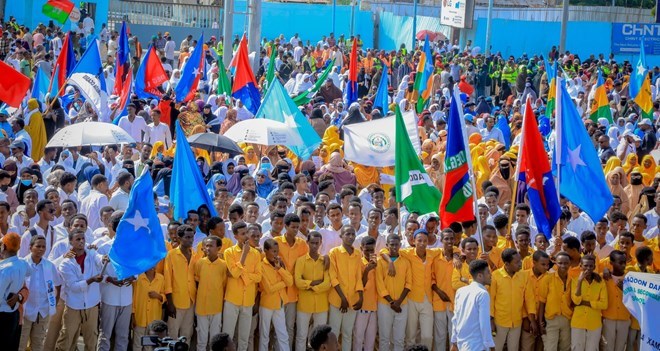Facebook Twitter (X) Instagram Somali Magazine - People's Magazine
On Sunday, hundreds of Mogadishu residents converged at the iconic Daljirka Dahsoon Monument to support Somalia’s historic shift toward a “one person, one vote” electoral system. This rally marked a major milestone in the country’s quest to replace its traditional clan-based power-sharing model with a democratic framework, symbolizing national unity with participants waving flags and banners from various regions and organizations.
The event, organized in the capital, drew prominent figures, including Banadir Regional Governor and Mogadishu Mayor Omar Filish, who lauded the public’s enthusiasm for this transformative political reform. “This is about empowering citizens to exercise their constitutional right to choose their leaders,” said Mayor Filish. “We are committed to making Somalia’s democracy more inclusive and representative.”
Support for Legislative Reforms Grows
The rally comes on the heels of legislative measures approved by Somalia’s bicameral Parliament, establishing frameworks for elections, political parties, and a national electoral commission. These reforms aim to lay the groundwork for universal suffrage—a concept that has been in the pipeline for years but faced numerous challenges.
The push for a “one person, one vote” system is championed by President Hassan Sheikh Mohamud and Prime Minister Hamza Abdi Barre, who have prioritized democratic reforms as central to Somalia’s political transformation. Youth and women’s organizations attending the rally expressed strong support for their leadership, with many acknowledging the importance of ensuring equal representation in Somalia’s governance.
“This moment is about the future of our democracy,” said Mohamed Ahmed Diriye (Yabooh), Banadir’s Deputy Governor for Security and Politics. “We are creating a system where every Somali voice counts.”
Challenges in Implementing Universal Suffrage
Despite the public’s overwhelming support, transitioning to a “one person, one vote” electoral system presents significant challenges. Logistical constraints, such as limited state infrastructure and ongoing insecurity due to al-Shabaab insurgency, pose major obstacles to nationwide implementation.
Historically, efforts to introduce universal suffrage date back to 2019, when Parliament passed similar legislation. However, political divisions, including resistance from then-opposition leader Hassan Sheikh Mohamud, delayed the reforms. Ironically, Mohamud, now serving as president, has become one of the strongest advocates for these changes.
Security remains a top concern, especially in regions where extremist groups maintain influence. Officials have emphasized the need for a transparent and inclusive process to build trust in the electoral system.
Public Optimism Amid Uncertainty
Despite these hurdles, officials and analysts remain optimistic about the reforms’ potential to foster long-term stability in Somalia. Sunday’s rally underscored the public’s desire for a political system that represents the will of the people rather than clan-based allegiances.
“This is not just about elections—it’s about shaping the future of Somalia,” Deputy Governor Diriye reiterated during his address.
The support demonstrated at the Daljirka Dahsoon Monument signals growing momentum for reforms that could redefine Somalia’s political landscape. The road ahead, while fraught with challenges, carries the promise of a more inclusive and democratic Somalia.

